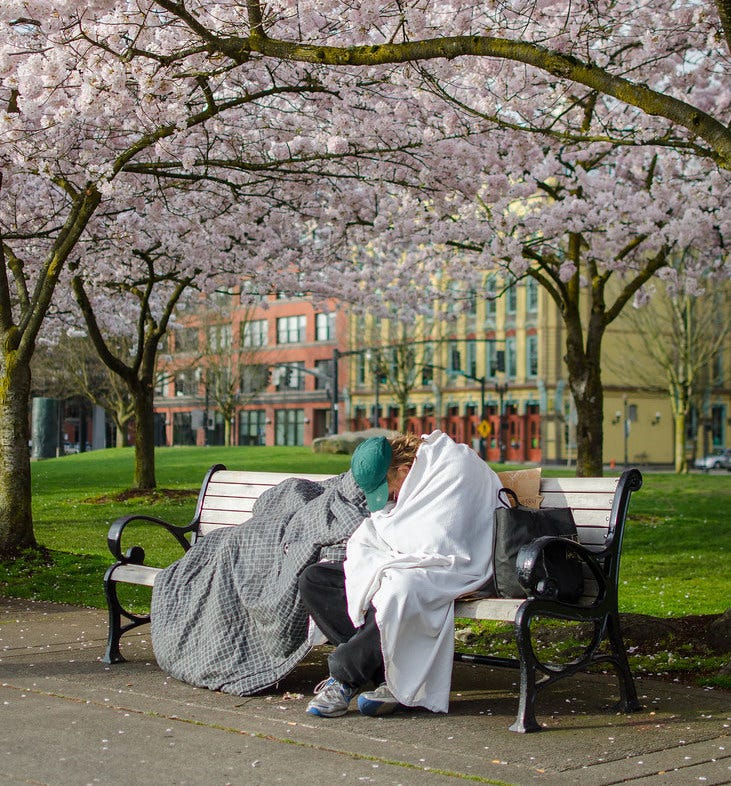“Ground Zero”: Old Town Community Steps Up Where Leaders Have Stumbled
Jesse Burke, owner of The Society Hotel and chair of the Old Town Community Association, weighs in on the bureaucratic dysfunction in the Rose City

Through my volunteer role as Chair of the Old Town Community Association, I have led the development of a goal-oriented approach to solving our collective problems by focusing on safety, cleanliness, and accessibility. The Old Town neighborhood has become “ground zero” in our region’s struggle with negative perceptions, both within our community, and around the nation.
In its simplest form, this approach involves measurable goals around safety, such as increasing lighting in the darkest parts of our neighborhood, and ensuring our police officers work hand in hand with people on the ground with more regular and coordinated communication; cleanliness, like increased trash pickup, responding to and removing untagged or abandoned vehicles; accessibility, like requiring 60” of walkway access down our sidewalks regardless of obstructions or activity on the sidewalk, and making it easy to access our neighborhood using surface streets. Read more about our 90 day plan here.
When I was asked to write this article, the question posed was, “why is community support for the 90 day plan important?” While perhaps the goals I wrote for safety, cleanliness and accessibility in Old Town are not all encompassing or even extraordinary, the response I received from the City of Portland and Multnomah County revealed something important:
● City bureaus and staff are eager for measurable goals to accomplish because they are not receiving these from leadership, and thus feel they are not working toward a common goal for the greater good;
● City leaders are happy to receive reasonable and inclusive suggestions from community leaders because they are getting mixed messages from the populous; and
● The county response as a partner in solving our collective problems continues to be defensive rather than open and/or collaborative.
In short, we as a city and county are seemingly unaware of how to craft meaningful and measurable goals, develop a plan, and then take the tangible steps to get there. The importance of community support for the 90-day plan is that Old Town is “ground zero,” and what starts here will inevitably make its way to the rest of the city and county, and as such, we as a community need to be reminded of how meaningful change takes place and demand this of our leadership (if not craft it ourselves).
Most of my professional life has been focused on strategic planning, developing metrics, crafting objectives with timelines, and assigning roles and responsibilities. Through careful gathering and analysis of data, you can identify very different kinds of problems and opportunities, allowing you to develop hypotheses and test solutions you might not have discovered through merely brainstorming solutions. Throughout this process, you must have frequent and regular check-ins to measure progress, determine if a new strategy is necessary, and regularly reassess if the current goal is even the correct goal given any new information.
It pains me to see Portland, “The City That Works,” floundering with indecision and cowering to the loudest voices, struggling to redefine an identity we can all get behind. It’s painful to see Multnomah County leaders stonewall community members, or come to the table (or respond to the press) defensively. These are all characteristics of a dysfunctional team. We are stuck swinging on a pendulum between big ideas in support of social movements, and our fear of implementing anything that might not be perfect, all while trying to balance the necessary infrastructures of a city and county.
Someone told me once that the west coast struggles with liberal idealism, while the east coast practices liberal pragmatism. Our idealism, while noble, leaves much to be desired in actual implementation. We excel in data collection, we seemingly adore the “process,” but we fear actually making commitments. We must both love the process of solving our problems, and hold ourselves accountable to our commitments and outcomes placed on a reasonable timeline.
And at the same time, I hear citizens blaming others for why things aren’t better -- but it’s a team sport to save a city and county. Just as we need good leadership, we need good followership. We take shears to an idea before it even has a chance to take root. We shout down our leaders. We eat our own. Meanwhile, we are spiraling downward. We are arguing over what the most perfect solution is while the ship keeps sinking. We have let perfect become the enemy of good. We have allowed the critic to count too much. These 90 Day Goals are an important reminder to our leadership, and our followership, that to accomplish anything, big or small, we’ve got to get clear on the goal and make sure it can be measured. It’s time to balance some of that west coast idealism with a dose of east coast pragmatism.
Jessie Burke is co-owner of The Society Hotel with her husband, Jonathan Cohen (locations in Portland, Oregon and Bingen, Washington). Jessie also serves as chair of the Old Town Community Association. She is the granddaughter of a Chinese immigrant, the daughter of a man who became paralyzed when she was six years old. She grew up very poor on the east coast and is mother to three young children. She is a former social worker, a long-time small business owner, and recently lost her brother-in-law to a Fentanyl overdose.





